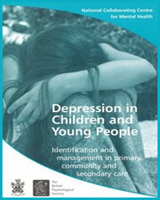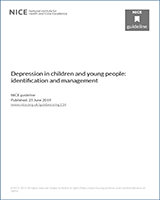All rights reserved. No part of this book may be reprinted or reproduced or utilised in any form or by any electronic, mechanical, or other means, now known or hereafter invented, including photocopying and recording, or in any information storage or retrieval system, without permission in writing from the publishers. Enquiries in this regard should be directed to the British Psychological Society.
NCBI Bookshelf. A service of the National Library of Medicine, National Institutes of Health.
National Collaborating Centre for Mental Health (UK). Depression in Children and Young People: Identification and Management in Primary, Community and Secondary Care. Leicester (UK): British Psychological Society (UK); 2005. (NICE Clinical Guidelines, No. 28.)
In June 2019 NICE updated the recommendations on psychological therapy in this guideline and in March 2015 NICE updated the recommendations on combination therapy. Most of the 2005 recommendations have been retained in NICE guideline NG134 depression in children and young people. The 2005 full guideline includes the evidence supporting those 2005 recommendations. Areas redacted in the PDF of this 2005 full guideline indicate areas that have been replaced by the 2015 or 2019 updates

Depression in Children and Young People: Identification and Management in Primary, Community and Secondary Care.
Show details1. Screening/detection/risk/early identification
- What risk factors are associated with depression in children and young people?
- Do screening instruments for depression have an influence on detection of depression in children and young people?
- How might services be organised to detect depression in children and young people?
2. Pharmacological interventions
- For children and young people who are depressed *, does any antidepressantφ when compared with placebo/comparator drug, produce benefits/harms on the specified outcomes?
- For children and young people who are depressed*, does any drug treatment (other than antidepressants) when compared with placebo/comparator drug, produce benefits/harms on the specified outcomes?
- For children and young people who are depressed*, does any antidepressant when compared with any psychological intervention produce benefits/harms on the specified outcomes?
- For children and young people who are depressed*, does the combination of an antidepressant and a psychological intervention when compared with an antidepressant alone/psychological intervention alone produce benefits/harms on the specified outcomes?
3. Psychological interventions
- For a psychological intervention that works, are [outcomes] correlated with any characteristics of the therapist/service user?
4. Self-help, family support, inpatient & other treatments
- For children and young people who are undiagnosed but at high risk of depression, does self-help or other psychological interventions when compared with ‘standard care’ alone, produce benefits/harms on the specified outcomes?
- For children and young people who are undiagnosed but at high risk of depression, does family support/parental education when compared with ‘standard care’, produce benefits/harms on the specified outcomes?
- For children and young people who are depressed, does self-help when compared with ‘standard care’, produce benefits/harms on the specified outcomes?
- For children and young people who are depressed, does family support/parental education when compared with ‘standard care’, produce benefits/harms on the specified outcomes?
- For children and young people who are depressed, is there any subgroup for which inpatient treatment produces benefits on the specified outcomes?
- For children and young people who are depressed, is there any subgroup in which social/environmental treatments alone produce benefits on the specified outcomes? (for example, in young people who are experiencing bullying or abuse)?
5. Relapse prevention
- For children and young people who are depressed, do antidepressant drugs, when compared with ‘standard care’, prevent relapse in the long term when prescribed in the recommended maintenance dose range?
- For children and young people who are depressed, how long should antidepressant drug treatment be continued for prevention of relapse?
- For children and young people who are depressed, do psychological interventions, when compared with ‘standard care’, prevent relapse in the long term?
Footnotes
- *
Sub-analyses will be done where possible by severity of depression (mild to moderate, and severe), service user characteristics (for example, age: 5–10, and 11–17 years old), comorbidity (such as, substance abuse, anxiety, physical symptoms, behavioural disorders), other factors (for example, school refusal, depressed parent, ethnicity), and treatment response/resistance (such as, severely and/or chronically depressed children who have not responded to an adequate trial of an antidepressant).
- †
Sub-analyses will be done where possible by class of antidepressant (such as, tricyclic and related antidepressants, SSRIs, MAOIs, other antidepressants) and treatment characteristics (for example, frequency and length of treatment).
- Clinical questions - Depression in Children and Young PeopleClinical questions - Depression in Children and Young People
Your browsing activity is empty.
Activity recording is turned off.
See more...
